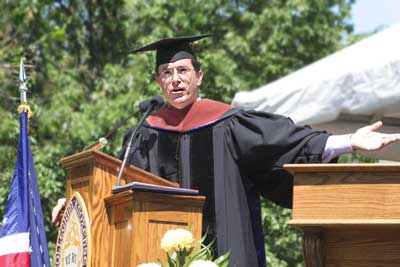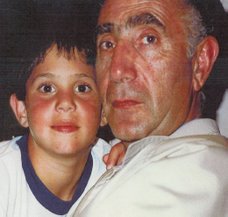2006 commencement address at knox college
When I was starting out in Chicago, doing improvisational theatre with Second City and other places, there was really only one rule I was taught about improv. That was, “yes-and.” In this case, “yes-and” is a verb. To “yes-and.” I yes-and, you yes-and, he, she or it yes-ands. And yes-anding means that when you go onstage to improvise a scene with no script, you have no idea what’s going to happen, maybe with someone you’ve never met before. To build a scene, you have to accept. To build anything onstage, you have to accept what the other improviser initiates on stage. They say you’re doctors—you’re doctors. And then, you add to that: We’re doctors and we’re trapped in an ice cave. That’s the “-and.” And then hopefully they “yes-and” you back. You have to keep your eyes open when you do this. You have to be aware of what the other performer is offering you, so that you can agree and add to it. And through these agreements, you can improvise a scene or a one-act play. And because, by following each other’s lead, neither of you are really in control. It’s more of a mutual discovery than a solo adventure. What happens in a scene is often as much a surprise to you as it is to the audience.
Well, you are about to start the greatest improvisation of all. With no script. No idea what’s going to happen, often with people and places you have never seen before. And you are not in control. So say “yes.” And if you’re lucky, you’ll find people who will say “yes” back.
Now will saying “yes” get you in trouble at times? Will saying “yes” lead you to doing some foolish things? Yes it will. But don’t be afraid to be a fool. Remember, you cannot be both young and wise. Young people who pretend to be wise to the ways of the world are mostly just cynics. Cynicism masquerades as wisdom, but it is the farthest thing from it. Because cynics don’t learn anything. Because cynicism is a self-imposed blindness, a rejection of the world because we are afraid it will hurt us or disappoint us. Cynics always say no. But saying “yes” begins things. Saying “yes” is how things grow. Saying “yes” leads to knowledge. “Yes” is for young people. So for as long as you have the strength to, say “yes.”










































.jpg)

